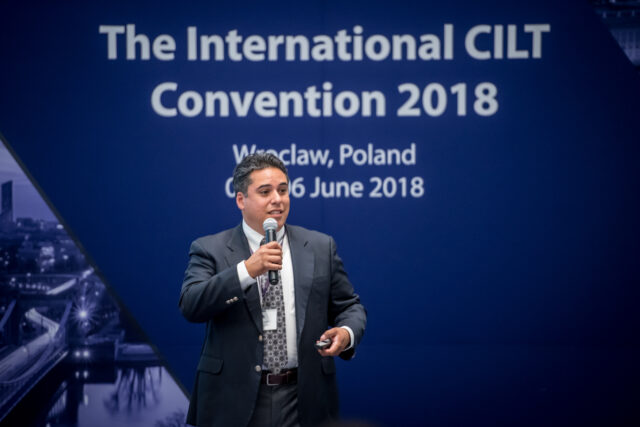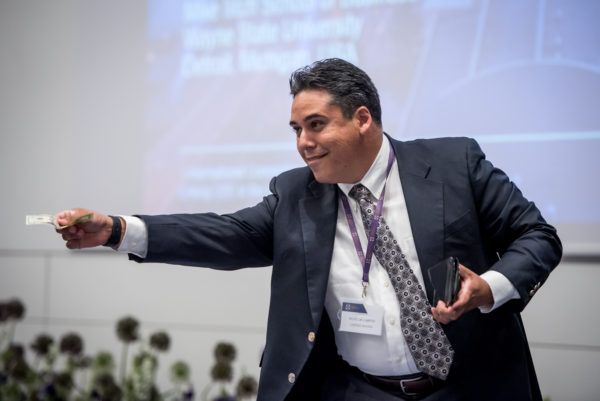Game-Changers

Industry 4.0 is disrupting business at every level around the world. At CILT International Convention in Wroclaw last June, Professor Hugo De Campos of the Mike Ilitch Business School, examined the trends created by Industry 4.0, and highlighted the game-changers reshaping the supply chain.
‘Why do companies exist?’ It is a baseline question, but for Professor De Campos it is fundamental. ‘What makes it all happen? There’s one thing that makes it happen…People around the world are willing to do this,’ he says, taking out his wallet. ‘Without that, we’re not here. Without that, governments have no money to invest in infrastructure. Without that, companies don’t have money to pay their employees to provide them with livelihoods…Why would someone be willing to pull their wallet out and put money into the system? It is because they are expecting to receive some kind of solution in return, a product or service that is of greater value than what they have given up.’
This is especially important given the evolution of the role of customer in modern supply chain thinking. ‘The role of the customer has become pre-eminent…in fact I have a debate with all of my finance professors. I say, “Why do firms exist?” They say, “To maximize shareholder wealth”, or “To make money”. I say, “Yes, but first and foremost it’s to satisfy customer needs, profitably.” I’m going to give you the profit but it comes second. We exist to solve problems. We exist to satisfy needs. So in that context, when we talk about autonomous vehicles, when we talk about electrification, it’s going to happen not for sake of the technology itself, but only in the context of it can help us better satisfy customer needs profitably.’

Crucially, these customer needs are changing. ‘As human beings on this Earth, we’ve recognised this Earth has finite resources, this earth has a fragile ecosystem…So as stewards of the Earth, it is becoming more and more important to us as customers that we be responsible, therefore companies need to be responsible as well, and then we get into the need of having to manage our CO2 emissions.’
As well as sustainability, customers are increasingly interested in ethical business practices, another need Professor De Campos see Industry 4.0 already responding to, this time using blockchain technology. The blockchain, invented by the person or persons known as Satoshi Nakamoto, is most famous for being the system that underpins Bitcoin and other cryptocurrencies. In the words of Don and Alex Tapscott, authors of Blockchain Revolution, the blockchain is ‘an incorruptible digital ledger that can be programmed to record not just financial transactions but virtually everything of value’.
Indeed, the strengths of the blockchain is its ability to distribute digital data without it being copied. ‘A traditional import process can be very cumbersome, very bureaucratic. A lot of paperwork, a lot of people need to touch that transaction. You put that on the blockchain, and you give permission access for certain people to see certain bits of information on a transaction, and you can facilitate that transaction moving through from customs clearance to the shipper, to the third party logistics provider, import of record etc.’
It is this thorough and incorruptible data trail that is exciting ethical consumers, as Professor De Campos explains, highlighting the diamond industry’s potential use of blockchain to establish provenance as an example. ‘Let me state here that what is enabling it is internet 4.0 and smart devices. Devices that can track products and will send signals into the blockchain, so that the blockchain is keeping track of these transactions. Such that, if you’re a consumer that buys a diamond, and the mining and manufacturing of that diamond has been tracked on the blockchain, you can go in and pull up the exact history of that diamond, and see that it came from a non-conflict zone for example. That is something the diamond industry is looking at.’
It is not just diamonds. ‘The chocolate industry is also looking into blockchain. Some companies are able to take the information in terms of how much money a farmer was paid. Because there’s concern among consumers that exploitation is taking place of farmers, and companies want to market to consumers that they are a fair trade company, and that the farmers who farmed the products they are selling were paid a fair wage.’ For Professor De Campos, the key point for supply chain management and the blockchain is ‘it is reducing supply chain friction’ and providing ‘transaction information visibility’.
As his final game-changer, Professor De Campos discussed the remarkable impact of internet 4.0 on the last mile, illustrating his point with personal experience of a new Amazon service. ‘This is a service I just signed up to…I have a security camera now, that’s facing my front door from inside my home, and I have a smart lock…So me and my family…we may have put in an order that’s going to arrive on Sunday while we’re at church…Amazon will provide the delivery person with a one-time use key, as I have permissioned Amazon to do this, and they will walk up to the door, they will let me know, they will start streaming my camera, they will unlock the door, put the package inside, close the door, automatically lock it, and I get a recording of the entire transaction. So the final mile is no-longer on your porch but inside your home.’
Professor Hugo A. De Campos is Assistant Professor of Global Supply Chain Management at the Mike Ilitch Business School, Wayne State University. Professor De Campos’ research interests concern strategic sourcing and managing the supply chain in order to maximize innovation performance as the desired outcome. After a successful decade in supply chain at General Motors, with assignments in Michigan, Oklahoma and, most recently, in Shanghai where he was responsible for $1.5 billion in purchases for GM Asia Pacific, Professor De Campos elected to pursue a long-held personal goal of a second career in academia.
CILT International Convention ran this year from the 3rd to the 6th of June under the twin themes of Linking CEE to the World and The Electric Car Revolution and its Impact on Logistics. Delegates enjoyed an exciting 4-day programme, including presentations by Professor David Cebon of the Centre for Sustainable Road Freight, WiLAT Global Advisor Dr Dorothy Chan, logistics expert Professor Kim Hassall, and Chris Jones, Vice-President and Chief Analyst at Canalys.
You can catch up on this and other presentations via our Facebook videos page. The PowerPoint presentations from International Convention are also available on our SlideShare page.
Next year we will be in Manchester for International Convention 2019. Organised under the theme of Global Solutions to Global Challenges, Industry 4.0, Future Leaders (YPs), and Women in Logistics and Transport (WiLAT) will be at the heart of International Convention 2019. Join us there to celebrate our centenary, and help shape the next 100 years of our Institute and our industry.